Posters
for the seminar "Colors and symbols for designing multimedia
instruction for international populations"
The
conference "Celebrating the Scholarship of College Teaching
and Learning" was hold by Center for Faculty Development
and Support of San Jose State University on May 1st, 2002. I
designed seven posters for a seminar hosted by Dr. Mei-Yan Lu
and Dr. Juan Davila, two professors of Instructional Department.
The topic of the seminar was "Colors and Symbols for Designing
Multimedia Instruction For International Populations."
(Click
the image to enlarge)
|
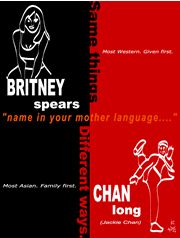 |
Same
things, different ways--"name in your mother language"
The
topic of these poster is the sequence of names in Eastern and
Western world. In most Western countries, people have their given
names first; but in most Asian countries, people put their family
names before their given names.
|
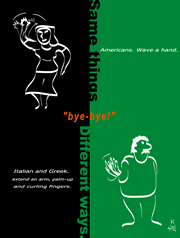 |
Same
things, different ways--"bye-bye!"
Americans
wave a hand to say good-bye as their body language; but in Italian
and Greek, people extend an arm, has pallm-up and curling fingers.
|
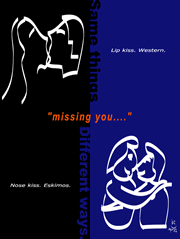 |
Same
things, different ways--"missing you..."
When
two Americans or Europeans friends meet each other, they may have
a lip kiss to express their missing and love. But for Eskimos,
a nose kiss is more usual.
|
|
Top
|
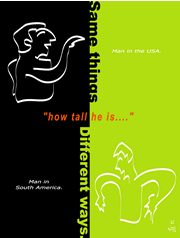 |
Same
things, different ways--"how tall he is..."
Americans
use one hand to show the height of a people; most South Americans
use both hands to express the same meaning.
|
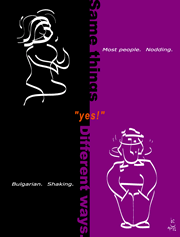 |
Same
things, different ways--"yes!"
For
most people of the world, nodding is a common way to say "yes";
but for Bulgarians, they usually use opposite way--shaking their
heads.
|
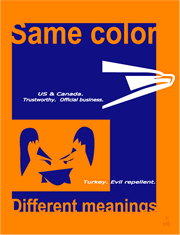 |
Same
color, different meanings--blue
Another
series posters that also related to culture differenes. In the
US and Canada, blue color means trustworthy and usually used by
official business sucs as the United State Postal Services; but
in some countries such as Turey, the blue color represents evil
repellent.
|
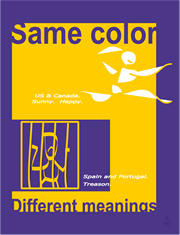 |
Same
color, different meanings--blue
In
the US and Canada, yellow color means sunny and happy; in Spain
and Portugal, yellow means treason.
|
|
|